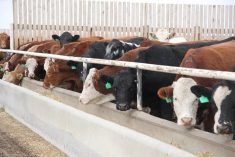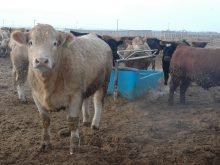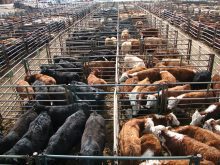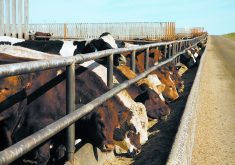This cattle market information is selected from the weekly report from Canfax, a division of the Canadian Cattlemen’s Association. More market information, analysis and statistics are available by becoming a Canfax subscriber by calling 403-275-5110 or at www.canfax.ca.
Beef prices price
Alberta fed steers rose $1.89 per hundredweight last week to $191.61, continuing the trend to higher.
Light volume traded, with most dressed sales coming in from $320 to $321 per cwt.
Read Also

Short rapeseed crop may put China in a bind
Industry thinks China’s rapeseed crop is way smaller than the official government estimate. The country’s canola imports will also be down, so there will be a lot of unmet demand.
Feedlots are continuing to manage contract inventories and were not motivated cash traders.
Heifer prices were comparable to steers, but there were not enough sales to establish a weekly trend.
Some cattle were priced to the United States based on the five-area average, and a few local cattle were booked off of the deferred Canfax weighted average price.
Western Canadian fed slaughter ending Jan. 28 slipped 12 percent lower than the previous week to 39,199 head. Year-to-date, that is two percent larger at 164,582 head.
Fed exports south for the week of Jan. 21 were 9,445 head, down five percent year over year and year-to-date are 12 percent lower at 28,750 head.
Light Ontario steer trade was steady with the previous week at $328 per cwt. delivered. Again, heifer sales were not repeatable and a price trend was not established.
Non-fed supplies are expected to tighten and free up fed slaughter hooks. Wet winter weather in major U.S. feeding areas is impacting feeder performance and carcass weights. That should support Canadian fed markets.
U.S. import corn is still moderating western Canadian barley prices and improving feeding margins. Feedlots are expected to continue to shuffle market-ready cattle to fill contract obligations, and cash market trade this week should be limited. A moderate leverage shift to feeders is also expected as packers work through inventory.
Overall, Canadian fed steer carcass weights increased for the fifth straight year in 2022, to 930 pounds, up 10 pounds from 2021. The larger weights helped bump carcass quality at a time when feed costs were stubbornly high and lift times increased.
Grading data shows that slightly more than 75 percent of all Grade A carcasses in 2022 were AAA or Prime, up from 71 percent in 2021 and 65 percent in 2019 when grading standards changed.
Butcher trends diverge
Butcher cows and bulls have been moving in opposite directions, with cows trading steady to $1 per cwt. higher and setting new annual highs and bulls setting annual lows. Competition in the non-fed market has improved, with both major packers buying cows late in the week. D2 cows traded $91 to $112 per cwt. in Alberta, to average $101.90 per cwt.
Western Canadian cow slaughter is averaging more than 9,000 head per week. In January, that was the largest January slaughter since 2010.
Cows could be on track to hit a spring high of $120 per cwt. if rallies continue.
New highs
Alberta 550-lb. steers and heifers set new annual highs last week, trading $1 to $6 per cwt. higher. Ontario calf prices are disappointing relative to the west, averaging $32 per cwt. lower than Alberta.
A year ago, U.S. feedgrains had a $120 per tonne cost-of-gain advantage over western Canadian feedlots, and Alberta calf and feeder prices were at a $5-$9 discount. This year the U.S. advantage is only $33 per tonne, and Alberta prices have been at a $17 to $19 per cwt. premium.
A large offering of bred cows across the Prairies last week saw Alberta bred cows averaging $1,875 per head and bred heifers averaging $2,025 per head. Bred cow prices have strengthened about $175 in the past month.
Calf and feeder prices are expected steady to higher.
U.S. cutout
In the United States last week, Choice cutouts fell 1.4 percent to $265.10 per cwt. while Select cutouts gained 0.9 percent to $253.66 per cwt.
Choice has been steadily weakening while Select has been mostly sideways. The spread narrowed to $11.44 per cwt. Historical trends suggest cutouts should be stable through the first quarter.
Insurance settlement
Livestock Price Insurance is now available for western Canadian calves until the second week of June for settlement between September 2023 and February 2024. Insurance can be purchased Tuesday through Thursday from 2 p.m. to 11 p.m. MST. Premiums are based on coverage level, and producers should know what benchmark they want. For example, break-even premiums are lower than for the maximum price. Top coverage last week was $282 per cwt. in Alberta and $286 per cwt. in Saskatchewan and Manitoba.














